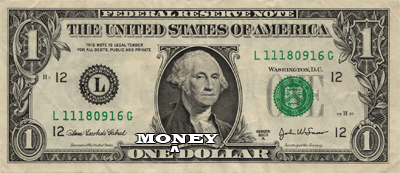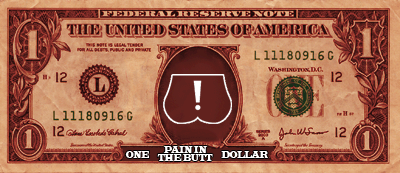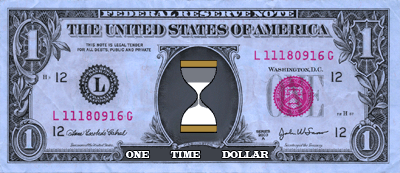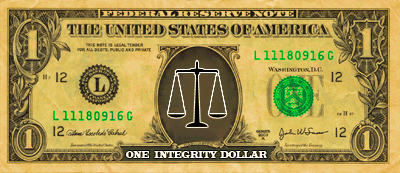Piracy and the four currencies
Cross-posted on gamasutra.
Part 1 of a multi-part series. (Part 2)
The problem with most piracy debates is that the only "cost" they discuss is money-dollars. So, the problem is framed somewhat like this:
Buying the game from us costs money-dollars. Pirating it costs zero money-dollars. Therefore, most people will pirate the game if they have the choice and we must do everything we can to physically stop them.

This is wrong because there are at least four currencies involved here, not just one (money-dollars).
I propose the following:
1. ($M) Money-dollars
2. ($T) Time-dollars
3. ($P) Pain-in-the-butt-dollars
4. ($I) Integrity-dollars
Whether a player buys or pirates a game depends on how much each service - not product! - "costs" in terms of these four currencies, as well as how much the player values each one.
For the purpose of this article Money-dollars will be denominated in USD, Time-dollars will be denominated in hours, and Pain-in-the-butt-dollars will be denominated in SI standard units of "amount-of-aspirin-I-have-to-take-after-beating-my-head-against-the-wall-for-an-hour." Feel free to measure Integrity-dollars in Hail-Marys, or hours spent lying awake at night.
Okay, I kid, I kid. Obviously, $P and $I are the most subjective "currencies" and it's hard to quantify them, even on an individual basis. That doesn't make them any less real, however - as I'm about to demonstrate, the $P and $I cost of a service are sometimes the most important ones.
So, let's start with my favorite example, Dragon Age II. On release, the game cost:
- $M 60
- $T 5
- $P 100
- $I 0
This game was expensive, it took forever to install and deal with the invasive DRM, which was only slightly more fun than getting groped by the TSA in the comfort of your own home. The only thing that was cheap about the game was that buying it was "the right thing to do," wasn't illegal, and it didn't make the player feel guilty. The only way this service competed with piracy was in the $I cost.
By comparison, pirate sites were offering the game for the low, low price of :
- $M 0
- $T 0.5
- $P 5
- $I 10
It cost no money, and the only time spent was downloading the game file. There was some pain-in-the-butt, ie, the player could accidentally download malware, needed to know how to use bittorent (easy for us geeks, not so for average joe/jane), and was constantly being hassled by lurid ads and pop-ups. Finally, there was the integrity cost that piracy is illegal, and in some sense, "morally wrong."
What if Dragon Age II had this price instead?
- $M 60
- $T 0.5
- $P 0.5
- $I 0
Ie, what if buying Dragon Age II was as easy as entering payment information, downloading the game, and running it? Now the game looks pretty competitive - it's actually less of a pain-in-the-butt than pirating it, and it doesn't "cost" any moral integrity or ask you to break any laws, either!
The $60 price tag will still turn those who value $M above all else to piracy, but now the game can capture all those who value $I and $P and $T more than $M, which is not a small number.
Again, I want to underscore that the relative values of each currency vary from player to player. People who live in low-income nations will be willing to spend more $T and $P if they can get the game for 0 $M. The $I cost is the most subjective of the four and depends on how much stock a player puts in "doing the right thing," (so to speak) or whether they even see any moral integrity in the choice at all.
Those who reject the notion of copyright altogether would likely value $I = 0, though even in this case, thinking of it instead as "the risk one takes of getting in trouble with the law" still raises $I to some non-zero value.
The $I cost also varies with the developer's behavior. The friendlier and more "deserving" you are in the eyes of the player, the higher the $I cost becomes for pirating the game. Conversely, a hostile attitude can easily lower the $I cost of piracy as nobody loses any sleep over pirating from an imagined "rich, greedy CEO."
Additionally, there's some strong interplay between the various currencies - a high $M cost makes the player feel entitled to a low $P cost - if I'm paying out the nose, I expect white-glove, full service VIP treatment. If I'm treated like a criminal instead, the $I cost of piracy just plummeted. I'll give my time and pain-in-the-butt dollars to the competition, thank you very much.
We used this theory to inform our strategy for Defender's Quest. Here's the current price of the game:
- $M 5-7
- $T 0.08
- $P 0.5
- $I 0
And here's what it's going for on your local torrent site:
- $M 0
- $T 0.08
- $P 5
- $I 10-20*
*Depending on whether pirating an "indie" game makes you feel more guilty than pirating from so-called "fat cats" like EA.
You will never be able to compete with pirate sites on price ($M) alone. Furthermore, at best you will only be able to match their price on time cost ($T), which is merely the time it takes to find and download your game.
The two areas you can compete on, and which do seem to make a big difference, are in pain-in-the-butt-ness and moral integrity. If you add any DRM, even if it only has a 1% false-positive rate, you've thrown up a $P cost for those customers that far exceeds that of the pirate sites.
Strip the DRM away and provide a friendly and easy-to-use purchasing experience, however, and you can drive the $P cost down to fractional amounts, far below what a sketchy torrent site can offer.
Also, by virtue of being the author, you provide the lowest $I cost in town. In the best case, you actually have a negative $I cost, which means buying the game gives the player a moral integrity credit. The player now feels like she's doing "the right thing," she doesn't worry about breaking the law, and gets a warm fuzzy feeling knowing she's supporting the makers of games she loves.
I'll throw in one more quick note - do not underestimate the value of $T, and look for ways in which you are potentially wasting the player's time. I got many e-mails from players telling us that one of the chief reasons for buying the game was our long demo, which also allowed them to export their save file. Many said they would not have bought the game if they had to start from scratch. For these players, spending the 7 money-dollars was not an issue, but having to lose the 2 time-dollars they'd already sunk into the demo would have been a deal-breaker.
Well, that's my theory. It's not perfect, but I think it's a lot better than what a lot of congressmen, CEO's, and so-called economists have to offer.
-Lars out
Part 1 of a multi-part series. (Part 2)



